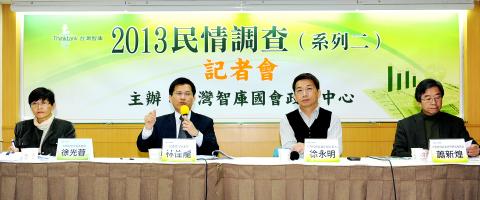More than 60 percent of respondents said they would vote in a proposed national referendum on the Fourth Nuclear Power Plant in New Taipei City’s (新北市) Gongliao District (貢寮) and almost 70 percent of those polled supported the suspension of construction and operations at the controversial power plant, a survey released yesterday showed.
The survey, conducted by Taiwan Thinktank from Feb. 2 until Monday, found that a majority of the respondents favored the anti-nuclear cause and stood on the opposite side to the government, which supports completing construction of the power plant.
When asked if they would vote in the referendum, 63.4 percent said they would vote and 18.7 percent said if they would if they could. If the referendum failed, 74.1 percent of those polled said the government should still suspend construction of the plant.

Photo: Chang Chia-ming, Taipei Times
Almost 70 percent of respondents said they would vote “yes” in the Chinese Nationalist Party (KMT)-proposed referendum, which would ask voters if construction and operations of the power plant should be suspended, with 16.6 percent saying they would vote “no” and 13.9 percent undecided.
Respondents were also suspicious of the government and state-owned Taiwan Power Co (Taipower, 台電), with 84.3 percent saying the government had not provided the public with sufficient information on nuclear energy and 66.5 percent saying that Taipower and the Atomic Energy Council were no longer credible sources of information.
The poll also found that more than 80 percent were concerned that a nuclear disaster could happen in Taiwan and 72.7 percent of those polled said they supported the nationwide anti-nuclear demonstration held on Saturday that attracted an estimated 200,000 participants.
People’s concerns about nuclear safety were so strong that 71.6 percent said they would still oppose completing the construction of the plant even if electricity prices would have to increase by 10 percent as the government has claimed.
Asked about the Referendum Act (公民投票法), 63.2 percent said the current threshold is unreasonably high and 63 percent said they would apply for absentee voting if the mechanism is adopted in the referendum.
Meanwhile, respondents also said they were unfamiliar with and lacked confidence in Premier Jiang Yi-huah (江宜樺), who was inaugurated last month, with 40.3 percent saying that Jiang would not be able to turn the economy around and 51.6 percent saying that they were not confident about the Premier’s pension reform plans.
Jiang’s approval rating was 23.7 percent, with a disapproval rating of 38.3 percent, while 38 percent said they had no opinion.
When asked about who they would support as the KMT’s presidential candidate in 2016, 36.2 percent favored New Taipei City Mayor Eric Chu (朱立倫) and 29 percent said they had no opinion.
Legislative Speaker Wang Jin-pyng (王金平) ranked second with 13.6 percent support, while Taichung Mayor Jason Hu (胡志強) was third with 8.7 percent.
Jiang garnered just 1.7 percent, behind Taipei Mayor Hau Lung-bin’s (郝龍斌) 6.2 percent and Vice President Wu Den-yih’s (吳敦義) 4.6 percent.
The survey collected 1,074 valid samples with a margin of error of 3 percentage points.

A magnitude 7.0 earthquake struck off Yilan at 11:05pm yesterday, the Central Weather Administration (CWA) said. The epicenter was located at sea, about 32.3km east of Yilan County Hall, at a depth of 72.8km, CWA data showed There were no immediate reports of damage. The intensity of the quake, which gauges the actual effect of a seismic event, measured 4 in Yilan County area on Taiwan’s seven-tier intensity scale, the data showed. It measured 4 in other parts of eastern, northern and central Taiwan as well as Tainan, and 3 in Kaohsiung and Pingtung County, and 2 in Lienchiang and Penghu counties and 1

FOREIGN INTERFERENCE: Beijing would likely intensify public opinion warfare in next year’s local elections to prevent Lai from getting re-elected, the ‘Yomiuri Shimbun’ said Internal documents from a Chinese artificial intelligence (AI) company indicated that China has been using the technology to intervene in foreign elections, including propaganda targeting Taiwan’s local elections next year and presidential elections in 2028, a Japanese newspaper reported yesterday. The Institute of National Security of Vanderbilt University obtained nearly 400 pages of documents from GoLaxy, a company with ties to the Chinese government, and found evidence that it had apparently deployed sophisticated, AI-driven propaganda campaigns in Hong Kong and Taiwan to shape public opinion, the Yomiuri Shimbun reported. GoLaxy provides insights, situation analysis and public opinion-shaping technology by conducting network surveillance

‘POLITICAL GAME’: DPP lawmakers said the motion would not meet the legislative threshold needed, and accused the KMT and the TPP of trivializing the Constitution The Legislative Yuan yesterday approved a motion to initiate impeachment proceedings against President William Lai (賴清德), saying he had undermined Taiwan’s constitutional order and democracy. The motion was approved 61-50 by lawmakers from the main opposition Chinese Nationalist Party (KMT) and the smaller Taiwan People’s Party (TPP), who together hold a legislative majority. Under the motion, a roll call vote for impeachment would be held on May 19 next year, after various hearings are held and Lai is given the chance to defend himself. The move came after Lai on Monday last week did not promulgate an amendment passed by the legislature that

AFTERMATH: The Taipei City Government said it received 39 minor incident reports including gas leaks, water leaks and outages, and a damaged traffic signal A magnitude 7.0 earthquake struck off Taiwan’s northeastern coast late on Saturday, producing only two major aftershocks as of yesterday noon, the Central Weather Administration (CWA) said. The limited aftershocks contrast with last year’s major earthquake in Hualien County, as Saturday’s earthquake occurred at a greater depth in a subduction zone. Saturday’s earthquake struck at 11:05pm, with its hypocenter about 32.3km east of Yilan County Hall, at a depth of 72.8km. Shaking was felt in 17 administrative regions north of Tainan and in eastern Taiwan, reaching intensity level 4 on Taiwan’s seven-tier seismic scale, the CWA said. In Hualien, the